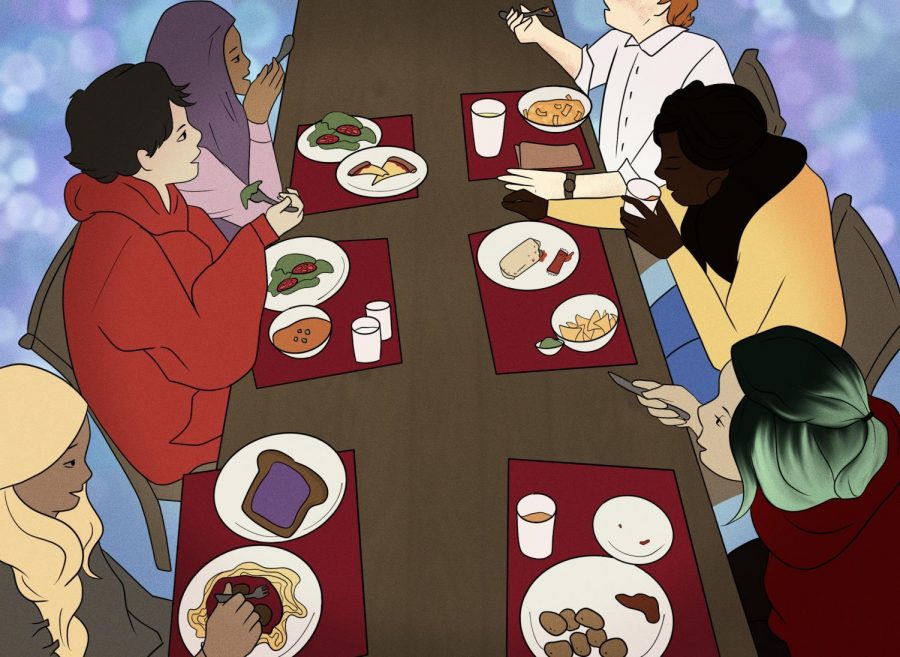Healthy variety is spice of life
WSU’s dining halls need more nutritious options for our students
October 14, 2021
I started my weight loss journey in August of last year, and I attribute most of my progress to switching to better eating. Adding more plants to my diet, eating more fiber, harshly limiting my sugars and eliminating fast food were all changes I made to build a healthier me.
It is not an easy change for everyone. America has prioritized junk food by making it inexpensive and accessible while making organic, healthy options expensive and inaccessible to low-income groups — most notably college students.
I will admit that my eating habits have gotten significantly worse since coming to college. Junk food has become preferable over cooking, and eating out has become very frequent for me. I suspect I am not alone on this.
It is important, however, to consider that college provides a space for us to change ourselves for the better. It is a transitional period from childhood to adulthood.
For many of us, we can get away with poor eating behaviors as children due to having high metabolism. However, unless we are athletes, it is only natural that our metabolism decreases as we age. Eating an entire bag of chips with two cans of soda poses a lot more consequences the older we get.
This is why I feel the role of WSU’s dining halls is important. They provide convenient, low-cost nutrition to the students. Yet, my concern is their lack of variety of healthy options. I am not saying that WSU does not encourage healthy eating, but rather there are fewer options than there should be.
I dine at the Southside Cafe. For breakfast, I usually see either French toast, waffles or pancakes offered at the Chef’s Creation station. Big Cat Grille offers breakfast sandwiches with a choice of hash browns. The bakery gives a wide variety of pastries and other desserts.
The only healthy option I see provided consistently is the fruit bar where you can dish up yogurt, granola and a variety of fruit.
It gets better as the day goes on, with the salad bar, sandwich station and Natural station opening. However, along with that is the opening of Stonewall Pizza and the transition of Big Cat Grille serving hamburgers and French fries. Chef’s Creation bounces back and forth on what options they give students.
One could argue there is a balance between healthy and unhealthy options, but I would like to set that point aside and discuss the variety of these healthy options. The bakery, for example, has such a wide variety of desserts that it is very hard to get the same thing twice.
Meanwhile, the Natural station is so consistent with their options that there is not much variation to keep people engaged with the food they offer.
I asked some students who dine at the other halls about what they think of the nutritional variety in the cafes.
Ian Stern, freshman global politics major, frequently eats at Northside Cafe. He said the healthy selections at the dining hall are solid but believes there could be a better variety of healthy drink options. Despite this, he still believes in the importance of healthy options.
“The presence of unhealthy foods like burgers and fries does encourage some unhealthy eating habits for me, mostly because of how tasty those options are,” he said. “Having fewer healthy options for food makes it even harder for people to eat healthy, especially if unhealthy options are more convenient.”
Alex Hagood, freshman computer science major, mostly eats at Hillside Cafe. He said the salad bar and Natural station are great options for people seeking healthy options but also recognizes that there is a lack of variety.
“If you’re seeking out just healthy foods, you’ll probably be disappointed,” he said.
Having little variety in terms of healthy food, in my view, could potentially encourage people to turn towards unhealthy options. Nobody wants to eat the same things every day. We as humans cannot stand it when something tastes bad or boring; we crave tasty food.
As delicious as the healthy food is at the WSU dining halls, there are only so many times it can be eaten before it loses its zest. There is no encouragement to continue getting the healthier options.
Another big factor to consider when discussing nutritional variety is how mood can impact our food selection. In 2015, Yvonne Ulrich-Lai, a researcher in the field of psychology at the University of Cincinnati College of Medicine, published an article with her team that discussed how stress impacts food selection.
Stress makes human beings select foods that are high in calories, sugars and carbohydrates in order to inhibit the stress response and boost mood, according to the article.
Given that stress is a prevalent experience in college, I believe it is safe to say that the presence of unhealthy options is also encouraging students to seek out the worst options available for mood improvement.
Therefore, as much as I am grateful for the healthy food options at WSU, I long for the day when a larger variety becomes accessible.


















